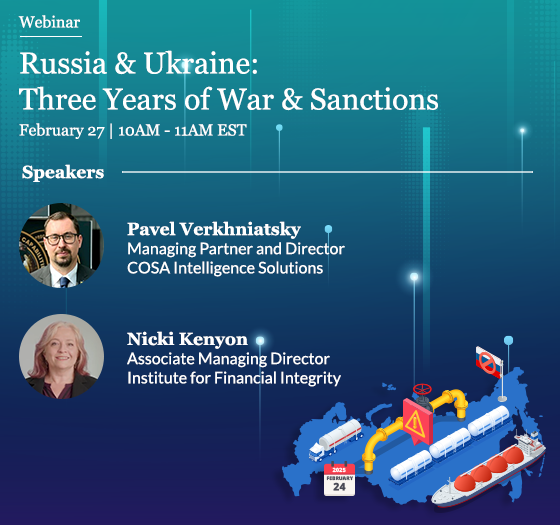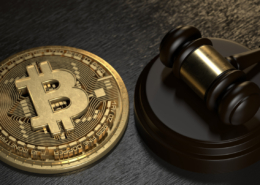Examining Evasion
Reviewing Real Cases of Sanctions Evasion by Russia, Iran, and North Korea
📅 February 10, 2025
📅 February 10, 2025
Sanctioned actors often use common tactics to attempt to evade restrictions. The methods they use are constantly changing in tandem with increased crackdowns on sanctions evasion.
The following are three examples illustrating some of the most common methods illicit actors have embraced to evade U.S. and multilateral sanctions. Understanding them is an important starting point for private sector firms in assessing and responding to their exposure.
Vladimir Voronchenko, a Russian citizen and legal permanent resident of the United States, in February 2023 was indicted for conspiring to evade sanctions, among other charges, by making more than $4 million in payments from his Bahamas-based shell company to maintain four properties owned by his close friend—sanctioned Russian oligarch Victor Vekselberg.
In March 2019, the U.S. disrupted an extensive sanctions evasion network that had transferred over a billion dollars and euros to, and procured vehicles for, U.S.-designated Iranian government institutions. The network involved a network of front companies in jurisdictions with lax illicit finance controls that relied on fraudulent records to conceal transactions and misrepresent beneficiaries.
North Korea has used digital assets and cryptocurrency mixers to evade sanctions and help finance its nuclear weapons program, in some cases also utilizing front companies and personnel stationed in China and Russia.
North Korea has utilized cybercriminal groups, such as the infamous Lazarus Group, to conduct large-scale hacks on cryptocurrency exchanges worldwide, stealing millions in digital assets. These assets are then laundered through a series of complex transactions across various blockchain platforms to obscure the funds’ origin. These laundered assets help North Korea finance its nuclear weapons program and evade international sanctions.
According to the U.S. Treasury Department, proceeds from North Korean cyber activities often end up at Chinese financial institutions after being layered using various schemes. In 2021 three Lazarus Group hackers who were at times stationed by Noth Korean government in China and Russia were indicted by U.S. authorities for their alleged involvement in a broad array of criminal cyber activities.
It’s more important than ever for compliance officers to understand and recognize sanctions evasion typologies. Learn about the six most common techniques illicit actors use to evade sanctions in our recent article, The Sanctions Evasion Threat – Six Common Typologies All Compliance Officers Should Know.
Join the Institute for Financial Integrity February 27th for a webinar marking the three-year anniversary of Russia’s invasion of Ukraine on February 24, 2022.
During this event, we discussed three years of sanctions, restrictions, and other measures countries around the world have implemented.
This was an outstanding opportunity to hear from an expert on the ground in Ukraine and understand compliance, due diligence, and investigations into Russia’s efforts to evade sanctions from Ukraine’s perspective.











 The New Counter-Illicit Finance Regime
The New Counter-Illicit Finance RegimeThis site uses cookies. By continuing to browse the site, you are agreeing to our use of cookies.
Accept settingsHide notification onlySettingsWe may request cookies to be set on your device. We use cookies to let us know when you visit our websites, how you interact with us, to enrich your user experience, and to customize your relationship with our website.
Click on the different category headings to find out more. You can also change some of your preferences. Note that blocking some types of cookies may impact your experience on our websites and the services we are able to offer.
These cookies are strictly necessary to provide you with services available through our website and to use some of its features.
Because these cookies are strictly necessary to deliver the website, refusing them will have impact how our site functions. You always can block or delete cookies by changing your browser settings and force blocking all cookies on this website. But this will always prompt you to accept/refuse cookies when revisiting our site.
We fully respect if you want to refuse cookies but to avoid asking you again and again kindly allow us to store a cookie for that. You are free to opt out any time or opt in for other cookies to get a better experience. If you refuse cookies we will remove all set cookies in our domain.
We provide you with a list of stored cookies on your computer in our domain so you can check what we stored. Due to security reasons we are not able to show or modify cookies from other domains. You can check these in your browser security settings.
These cookies collect information that is used either in aggregate form to help us understand how our website is being used or how effective our marketing campaigns are, or to help us customize our website and application for you in order to enhance your experience.
If you do not want that we track your visit to our site you can disable tracking in your browser here:
We also use different external services like Google Webfonts, Google Maps, and external Video providers. Since these providers may collect personal data like your IP address we allow you to block them here. Please be aware that this might heavily reduce the functionality and appearance of our site. Changes will take effect once you reload the page.
Google Webfont Settings:
Google Map Settings:
Google reCaptcha Settings:
Vimeo and Youtube video embeds:
You can read about our cookies and privacy settings in detail on our Privacy Policy Page.
Privacy Policy